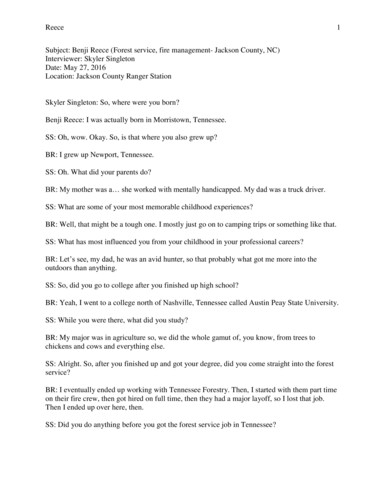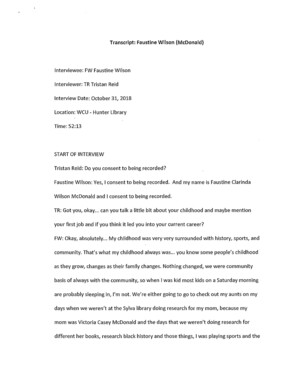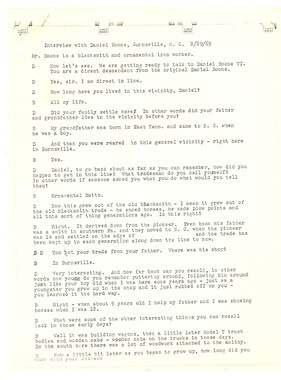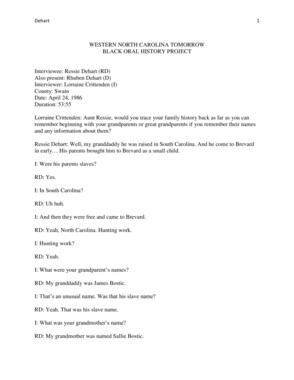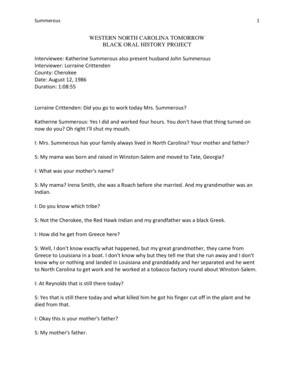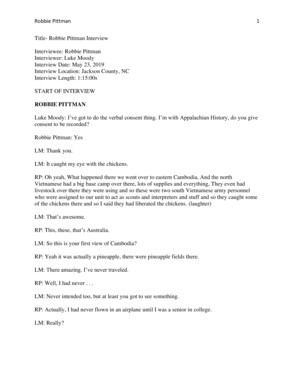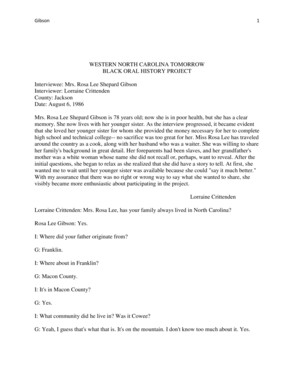Western Carolina University (7)
View all
- Civil War in Southern Appalachia (1)
- Craft Revival (18)
- Great Smoky Mountains - A Park for America (46)
- LGBTQIA+ Archive of Jackson County (5)
- Oral Histories of Western North Carolina (216)
- Picturing Appalachia (5)
- Western Carolina University: Making Memories (3)
- Canton Champion Fibre Company (0)
- Cherokee Traditions (0)
- Highlights from Western Carolina University (0)
- Horace Kephart (0)
- Journeys Through Jackson (0)
- Stories of Mountain Folk (0)
- Travel Western North Carolina (0)
- Western Carolina University Fine Art Museum Vitreograph Collection (0)
- Western Carolina University Herbarium (0)
- Western Carolina University Publications (0)
- Western Carolina University Restricted Electronic Theses and Dissertations (0)
- Western North Carolina Regional Maps (0)
- World War II in Southern Appalachia (0)
University of North Carolina Asheville (0)
View all
- Faces of Asheville (0)
- Forestry in Western North Carolina (0)
- Grove Park Inn Photograph Collection (0)
- Isaiah Rice Photograph Collection (0)
- Morse Family Chimney Rock Park Collection (0)
- Picturing Asheville and Western North Carolina (0)
- Appalachian National Park Association (3)
- Southern Highland Handicraft Guild (5)
- Allanstand Cottage Industries (0)
- Bennett, Kelly, 1890-1974 (0)
- Berry, Walter (0)
- Brasstown Carvers (0)
- Cain, Doreyl Ammons (0)
- Carver, George Washington, 1864?-1943 (0)
- Cathey, Joseph, 1803-1874 (0)
- Champion Fibre Company (0)
- Champion Paper and Fibre Company (0)
- Cherokee Indian Fair Association (0)
- Cherokee Language Program (0)
- Crittenden, Lorraine (0)
- Crowe, Amanda (0)
- Edmonston, Thomas Benton, 1842-1907 (0)
- Ensley, A. L. (Abraham Lincoln), 1865-1948 (0)
- Fromer, Irving Rhodes, 1913-1994 (0)
- George Butz (BFS 1907) (0)
- Goodrich, Frances Louisa (0)
- Grant, George Alexander, 1891-1964 (0)
- Heard, Marian Gladys (0)
- Kephart, Calvin, 1883-1969 (0)
- Kephart, Horace, 1862-1931 (0)
- Kephart, Laura, 1862-1954 (0)
- Laney, Gideon Thomas, 1889-1976 (0)
- Masa, George, 1881-1933 (0)
- McElhinney, William Julian, 1896-1953 (0)
- Niggli, Josephina, 1910-1983 (0)
- North Carolina Park Commission (0)
- Osborne, Kezia Stradley (0)
- Owens, Samuel Robert, 1918-1995 (0)
- Penland Weavers and Potters (0)
- Rhodes, Judy (0)
- Roberts, Vivienne (0)
- Roth, Albert, 1890-1974 (0)
- Schenck, Carl Alwin, 1868-1955 (0)
- Sherrill's Photography Studio (0)
- Smith, Edward Clark (0)
- Southern Highlanders, Inc. (0)
- Stalcup, Jesse Bryson (0)
- Stearns, I. K. (0)
- Thompson, James Edward, 1880-1976 (0)
- United States. Indian Arts and Crafts Board (0)
- USFS (0)
- Vance, Zebulon Baird, 1830-1894 (0)
- Weaver, Zebulon, 1872-1948 (0)
- Western Carolina College (0)
- Western Carolina Teachers College (0)
- Western Carolina University (0)
- Western Carolina University. Mountain Heritage Center (0)
- Whitman, Walt, 1819-1892 (0)
- Wilburn, Hiram Coleman, 1880-1967 (0)
- Williams, Isadora (0)
- 1700s (1)
- 1830s (1)
- 1840s (1)
- 1850s (1)
- 1860s (1)
- 1890s (2)
- 1900s (31)
- 1910s (3)
- 1920s (6)
- 1930s (9)
- 1940s (17)
- 1950s (25)
- 1960s (52)
- 1970s (45)
- 1980s (33)
- 1990s (22)
- 2000s (35)
- 2010s (48)
- 2020s (21)
- 1600s (0)
- 1800s (0)
- 1810s (0)
- 1820s (0)
- 1870s (0)
- 1880s (0)
- Appalachian Region, Southern (44)
- Asheville (N.C.) (8)
- Avery County (N.C.) (1)
- Buncombe County (N.C.) (50)
- Cherokee County (N.C.) (14)
- Clay County (N.C.) (3)
- Graham County (N.C.) (2)
- Great Smoky Mountains National Park (N.C. and Tenn.) (2)
- Haywood County (N.C.) (37)
- Henderson County (N.C.) (3)
- Jackson County (N.C.) (125)
- Knox County (Tenn.) (1)
- Macon County (N.C.) (15)
- Madison County (N.C.) (5)
- McDowell County (N.C.) (1)
- Mitchell County (N.C.) (5)
- Polk County (N.C.) (2)
- Qualla Boundary (8)
- Rutherford County (N.C.) (1)
- Swain County (N.C.) (24)
- Watauga County (N.C.) (3)
- Waynesville (N.C.) (1)
- Yancey County (N.C.) (3)
- Blount County (Tenn.) (0)
- Knoxville (Tenn.) (0)
- Lake Santeetlah (N.C.) (0)
- Transylvania County (N.C.) (0)
- Clippings (information Artifacts) (1)
- Interviews (274)
- Letters (correspondence) (3)
- Manuscripts (documents) (7)
- Personal Narratives (2)
- Photographs (18)
- Questionnaires (3)
- Sound Recordings (255)
- Transcripts (322)
- Video Recordings (physical Artifacts) (5)
- Aerial Photographs (0)
- Aerial Views (0)
- Albums (books) (0)
- Articles (0)
- Artifacts (object Genre) (0)
- Biography (general Genre) (0)
- Cards (information Artifacts) (0)
- Crafts (art Genres) (0)
- Depictions (visual Works) (0)
- Design Drawings (0)
- Drawings (visual Works) (0)
- Envelopes (0)
- Facsimiles (reproductions) (0)
- Fiction (general Genre) (0)
- Financial Records (0)
- Fliers (printed Matter) (0)
- Glass Plate Negatives (0)
- Guidebooks (0)
- Internegatives (0)
- Land Surveys (0)
- Maps (documents) (0)
- Memorandums (0)
- Minutes (administrative Records) (0)
- Negatives (photographs) (0)
- Newsletters (0)
- Newspapers (0)
- Occupation Currency (0)
- Paintings (visual Works) (0)
- Pen And Ink Drawings (0)
- Periodicals (0)
- Plans (maps) (0)
- Poetry (0)
- Portraits (0)
- Postcards (0)
- Programs (documents) (0)
- Publications (documents) (0)
- Scrapbooks (0)
- Sheet Music (0)
- Slides (photographs) (0)
- Specimens (0)
- Speeches (documents) (0)
- Text Messages (0)
- Tintypes (photographs) (0)
- Vitreographs (0)
- Appalachian National Park Association Records (21)
- Cataloochee History Project (10)
- George Masa Collection (4)
- Horace Kephart Collection (3)
- Love Family Papers (1)
- WCU Gender and Sexuality Oral History Project (32)
- WCU Mountain Heritage Center Oral Histories (20)
- WCU Oral History Collection - Mountain People, Mountain Lives (47)
- Western North Carolina Tomorrow Black Oral History Project (64)
- A.L. Ensley Collection (0)
- Appalachian Industrial School Records (0)
- Axley-Meroney Collection (0)
- Bayard Wootten Photograph Collection (0)
- Bethel Rural Community Organization Collection (0)
- Blumer Collection (0)
- C.W. Slagle Collection (0)
- Canton Area Historical Museum (0)
- Carlos C. Campbell Collection (0)
- Cherokee Studies Collection (0)
- Daisy Dame Photograph Album (0)
- Daniel Boone VI Collection (0)
- Doris Ulmann Photograph Collection (0)
- Elizabeth H. Lasley Collection (0)
- Elizabeth Woolworth Szold Fleharty Collection (0)
- Frank Fry Collection (0)
- Gideon Laney Collection (0)
- Hazel Scarborough Collection (0)
- Hiram C. Wilburn Papers (0)
- Historic Photographs Collection (0)
- Humbard Collection (0)
- Hunter and Weaver Families Collection (0)
- I. D. Blumenthal Collection (0)
- Isadora Williams Collection (0)
- Jesse Bryson Stalcup Collection (0)
- Jim Thompson Collection (0)
- John B. Battle Collection (0)
- John C. Campbell Folk School Records (0)
- John Parris Collection (0)
- Judaculla Rock project (0)
- Kelly Bennett Collection (0)
- Major Wiley Parris Civil War Letters (0)
- Map Collection (0)
- McFee-Misemer Civil War Letters (0)
- Mountain Heritage Center Collection (0)
- Norburn - Robertson - Thomson Families Collection (0)
- Pauline Hood Collection (0)
- Pre-Guild Collection (0)
- Qualla Arts and Crafts Mutual Collection (0)
- R.A. Romanes Collection (0)
- Rosser H. Taylor Collection (0)
- Samuel Robert Owens Collection (0)
- Sara Madison Collection (0)
- Sherrill Studio Photo Collection (0)
- Smoky Mountains Hiking Club Collection (0)
- Stories of Mountain Folk - Radio Programs (0)
- The Reporter, Western Carolina University (0)
- Venoy and Elizabeth Reed Collection (0)
- WCU Students Newspapers Collection (0)
- William Williams Stringfield Collection (0)
- Zebulon Weaver Collection (0)
- African Americans (85)
- Artisans (19)
- Cherokee pottery (1)
- Cherokee women (4)
- Church buildings (1)
- College student newspapers and periodicals (2)
- Education (2)
- Floods (12)
- Folk music (2)
- Forest conservation (1)
- Forests and forestry (2)
- Gender nonconformity (4)
- Great Smoky Mountains National Park (N.C. and Tenn.) (5)
- Maps (1)
- Mines and mineral resources (2)
- Rural electrification -- North Carolina, Western (2)
- School integration -- Southern States (2)
- Segregation -- North Carolina, Western (4)
- Slavery (4)
- Sports (2)
- Storytelling (4)
- Weaving -- Appalachian Region, Southern (3)
- Wood-carving -- Appalachian Region, Southern (3)
- World War, 1939-1945 (2)
- Appalachian Trail (0)
- Cherokee art (0)
- Cherokee artists -- North Carolina (0)
- Cherokee language (0)
- Civilian Conservation Corps (U.S.) (0)
- Dams (0)
- Dance (0)
- Forced removal, 1813-1903 (0)
- Hunting (0)
- Landscape photography (0)
- Logging (0)
- North Carolina -- Maps (0)
- Paper industry (0)
- Postcards (0)
- Pottery (0)
- Railroad trains (0)
- Waterfalls -- Great Smoky Mountains (N.C. and Tenn.) (0)
Interview with Benji Reese
Item
Item’s are ‘child’ level descriptions to ‘parent’ objects, (e.g. one page of a whole book).
-
-
Reece 1 Subject: Benji Reece (Forest service, fire management- Jackson County, NC) Interviewer: Skyler Singleton Date: May 27, 2016 Location: Jackson County Ranger Station Skyler Singleton: So, where were you born? Benji Reece: I was actually born in Morristown, Tennessee. SS: Oh, wow. Okay. So, is that where you also grew up? BR: I grew up Newport, Tennessee. SS: Oh. What did your parents do? BR: My mother was a… she worked with mentally handicapped. My dad was a truck driver. SS: What are some of your most memorable childhood experiences? BR: Well, that might be a tough one. I mostly just go on to camping trips or something like that. SS: What has most influenced you from your childhood in your professional careers? BR: Let’s see, my dad, he was an avid hunter, so that probably what got me more into the outdoors than anything. SS: So, did you go to college after you finished up high school? BR: Yeah, I went to a college north of Nashville, Tennessee called Austin Peay State University. SS: While you were there, what did you study? BR: My major was in agriculture so, we did the whole gamut of, you know, from trees to chickens and cows and everything else. SS: Alright. So, after you finished up and got your degree, did you come straight into the forest service? BR: I eventually ended up working with Tennessee Forestry. Then, I started with them part time on their fire crew, then got hired on full time, then they had a major layoff, so I lost that job. Then I ended up over here, then. SS: Did you do anything before you got the forest service job in Tennessee? Reece 2 BR: I just, mostly just labor stuff, mowing yards, or building houses, or swimming pools, or just anything really. SS: So, what was your major decision that led you to join the forest service? BR: It was a job, and I needed to be outside. It was either that or working with wildlife, and couldn’t get in the wildlife, so I went with forestry. SS: Did you have to go through any type of training to join, or…? BR: Yeah. The easiest way to get into forestry is through fire control. So, they’ve got, you know, a whole multitude of classes for that, but once we got the basic classes out of the way we were able to start, you know, fire control, and working in that. SS: So is fire control like, part of the main job that the forest service has? BR: Certain times of the year it is. Through the, you know, fall and the spring it’s primary fire duty. Then from, you know, late spring through summer in the fall, it’s more basic forest management. SS: What past experiences do you believe helped you prepare for the forest service? BR: Mostly just being out in the woods when I was a kid. You know, learning how to navigate through the mountains, figuring out what trees are what, and just helping with all that. SS: So, in your job, what is your least favorite part of it? BR: Probably checking all the logging jobs. We got to manage, you know, for water quality, make sure they’re not letting, you know, advanced erosion occur. So, just keeping all the soil where it needs to be and where it don’t need to be. SS: So, has the, the logging jobs are obviously what you do not like, but how has it changed since the early days of logging in Western North Carolina? BR: From Western North Carolina, I can’t give you a good example, but mostly on the Tennessee side, you know, the early days, it was pretty much they cut everything. If you look at National Park in the thirties, you know, it’s pretty well clear cut. A lot of people don’t realize that, you know, it was more of a, just a “take everything and leave nothing” attitude then. And as the conservation movement kept going, it got more in the, you know, utilizing the timber better. Just taking what we need and leaving what we don’t, and making sure it gets regenerated back. SS: Is that kind of the mindset that logging has now? BR: Yeah, for the most part. Unfortunately, what’s happened a lot over the years, you know, they’ve went in and just took the most valuable trees and left trees that was either suppressed, or you know, the unvaluable stuff. That’s what a lot of what we got now is, and it’s getting worse as Reece 3 it goes on because they’re getting more selective. We try to urge them to take more trees now than probably what they did twenty years ago, but, after that they… They don’t like to take them, but you know, the more they take the more we can get regenerated and get better quality timber put back in. SS: So, since you obviously do not like the timber industry, what is your favorite thing about working the forest service? BR: I mean, I like the timber industry, but I guess probably the favorite thing is getting to travel with fire control. SS: At this time of year, is fire control a huge issue, or…? BR: This time of year in Western North Carolina it’s not, but the farther you get our west, you know, they’re getting into their fire seasons now. Usually around mid to late August into September they’ll start pulling us to go out west to help fight fire out there. SS: So, you guys, since the National Forest Service is a national organization, you guys are pulled all across the country to help? BR: Yeah. The way it works is we’re more like just subcontractors then, you know. They’ll pick us up, and they’ll pay us the flat rate, and we go out and help. Then, you know, it’s typically an eighteen day assignment, and at the end of eighteen days we’re back here. SS: Have you ever been called out to do that? BR: Yeah. Just last year I spent eighteen days in California, then about twelve in Oregon. But we go pretty much, they call us “all-risk response.” We’ll go for hurricanes, people’s been for shuttle recovery. We go for floods, tornadoes, we go for everything. SS: Have you guys ever had to call in other people to come here and to help? BR: Yeah. We do that, you know, especially… Well, I don’t know if you heard that, you know, this spring had a lot of fires over toward Asheville and all that, and they had people you know, come from New Mexico and all kinds of places to help with those. SS: Within in the forest service is there a special group of people who are specifically with fires, or…? BR: With us there’s not. Now, if you go to a federal level they do have, you know, certain people that their only job is fire control. SS: Alright. So, here in Jackson County, BR: Mm hmm. Reece 4 SS: What are some of your main duties that you have to do? BR: Of course we got the fire control, and like I said, you know, we check all the logging jobs, but the primary thing, you know, we help with citizens is we help them manage their timber. You know, that way they can call us say, “Hey, I’m wanting to sell this timber,” and we can go out and say, you know, “Well yeah, you need to sell it, or you might want to hold off, because you got good timber that’s still growing good. If you’ll give it, you know, ’X’ number of years, you know, you’ll increase your profits off of it.” So we provide that service. We do what we call “TSI,” Timber Stand Improvement. If people’s got kudzu or grape vines we’ll go out and treat that and try to kill that so the timber can keep growing, you know, uninhibited. SS: For you guys, in order to do that, do people get in contact with you, or do you kind of go out and see for yourself? BR: We do it both ways. You know, the primary is they contact us, and we’ll got out and look at it and try to help them best way we can. And we do try to solicit business too, just to get down to it, you know, get people involved with it and help them, you know, manage better even if they didn’t realize what they had. SS: In order to do this, do you have to bring in volunteers ever? BR: No. Really with us, what we do in Jackson County is we got two full time positions and a part time position. So the part time usually works from the first of October until around this time of year then, they get laid off. Then, me and the other full time guy, we keep going doing the same thing. SS: And so you and the other full time member, you basically do all of the labor and all of the organization yourself? BR: Oh yeah. SS: What type of like, responsibility comes with that, other than…? BR: There’s a lot of it comes, I mean. You know, not only with wild fire control, we also do prescribed burns. We’ll line those up. You know, we’ll line it up to where we can actually safely, you know, do each controlled burn. Reduce, you know, not only the fuel amount, but also open up spaces for trees to continue to grow. We’ll do the management plans, go out and collect the data for those, come back and you know, type up the reports. We just do, a lot of it unfortunately is paperwork, but you know, we do a lot of on-the-ground stuff too. SS: With all the paperwork that you have to do, is it usually just the data reports, or is it…? BR: Yeah, we’ve got reports, fire reports, safety reports. We’ve got a lot of that. But the biggest thing is writing the management plans for people. And with the management plans they also get a tax break, because you know, they’re using their land to grow timber instead of, you know, Reece 5 putting a business on it or opening it up for something else. So, they get a little bit of a tax break to preserve some of that natural habitat. SS: Is the idea of a tax break, is it something that drives people to do that? BR: Yeah. That’s one of the big contributing factors of people getting in touch with us. SS: Oh, alright. So, how long have you been the Jackson County Forest Service [inaudible]? BR: Jackson County just two years. Then before that, I spent roughly about four years in Swain County, then, had some time down on the coast. Then the previous three years of that in Tennessee. About ten years all together. SS: So, in your ten years in the forest service, have you seen any changes, or…? BR: Yeah, there’s been some changes. A lot of it . . . Most of it’s been good. There’s been some changes that didn’t sit well with a lot of people, but you know, we’re pretty stable right now as far as our management, and the way things are passed down to us and what we’ve got to follow and do. SS: So, is there a higher authority or some type of board that looks down on you all? BR: Yes. The way we’re set up, the county level, you know, is the primary, I guess, workforce part of it. Then, you’ve got a district level, which oversees a district. And this is district 9 here, which covers from Haywood to Cherokee County, so, the seven far western counties. There’s thirteen districts in the state and there’s three regions. You got the mountain, the piedmont, and the coastal. Then, after region you go to our central office, which is all in Raleigh. That’s where all the policy and procedures is made, in Raleigh. SS: And do you have any input for our district, or…? BR: Yeah. The way, you know, we normally have a, what’s called “county ranger’s meeting.” We can bring up issues we’re having, and of course, after that it just gets passed up the chain of command through the district and the region. SS: What type of things have you passed up the chain of command? BR: Mostly it’s just our manpower. When we’re running high fire danger days, we bring in temporary help then. You, know, we can bring in up to seven, that’s the most we can bring in, which is a tremendous help, getting that many. But, the problem we have is that temporary help, you know, most people, you got to be over eighteen, have your fire classes, and all that. Well, most of those people, you know, they got their own jobs too, so we’re trying to balance between people working full time at another job, and also coming and helping us when we need it. But, usually it’s equipment that, you know, we send up mostly, you know, changes in that or a standard that we’d like to see. Reece 6 SS: You talked about bringing in people to help you, like, what type of process do they have to go through, and training? BR: They’ve got to take their basic firefighting classes, which, you know, just an introduction to wild land fire, and we’ve got fire behavior classes, we got leadership classes, and what they call the “ICS,” or the Instant Command System, which we adopted from the military. So, they’ve got to be familiar with that, and they’ve got to be over eighteen. And then they just got to show an interest and, you know, we’ll sign them up and bring them on, and work them that way. SS: Of any of the things that you mentioned that you guys have passed up to the state level, have they been implemented across the state, or just for this district? BR: Unfortunately, a lot of it’s just regional. That’s where the primary stuff, you know, works. We are three distinct districts, you know, we’ve all got different needs, so a lot of times they come up with a standard and they tweak it just a little bit to accommodate each region. SS: Has there been anything from the state level that they have given to you, or passed down? BR: As far as standards? SS: Yeah. BR: A lot of it seems like the, you know, the region 1 or the coastal area, seems like they’ve got more input just because they’ve got a larger workforce. So, a lot of times stuff that they implement for them thinking it’s good statewide just don’t work up here. SS: Big difference between the mountains and the ocean. BR: That’s right. SS: So, you also worked in Tennessee in the forest service, is there any differences other than geography between the two states? BR: Yeah, there’s quite a bit of difference. North Carolina’s actually leaps and bounds ahead as far as the forest management side, the water quality, and also on the fire control part of it too. You know, it’s not a universal standard for all states, but… And that’s where we’re fortunate here. North Carolina’s recognized, pretty much nationwide as a leader in state forestry. SS: What type of things do put North Carolina ahead of other forestry service? BR: Mostly the training, the amount of training North Carolina gives. We do a lot of our training in the summertime when fires around here is down, but we do train year round. I can speak for Tennessee. They have one training session a year, so that really slows people down over there. And here, you’ve pretty much got to have some sort of a degree to get hired on. So, that’s another big difference, and the pay scale’s better here than Tennessee too. Reece 7 SS: Since North Carolina’s nationally recognized, are you used as an example in other states? BR: Sometimes, you know, they’ll pull stuff that North Carolina does and use it in other places, but a lot of times, you know, the pride in the state, you know, they’ll try to keep everything local too. SS: You mentioned briefly earlier about the water quality that you have to do, can you explain that a little bit more? BR: We deal… The sedimentation and the Water Quality Act, I believe is the name of it, was passed, so any time you’re building a house, you know, disturbing a lot the ground, or you know, the soil and stuff like that, you’ve got to get a permit. And one of the process of getting that permit, you’ve got to have a sedimentation control plan. You got to have an engineer come out and look at it. Well, in forestry, it’s exempt from that. So, since it’s exempt from having those, that’s what gives us the authority to go out and on the people’s land, and, you know, talk with loggers, say, “I need you to do this or that.” But the primary thing is, you know, just keep clean water, especially since this is a large trout area, the more sediment that gets in the creek, you know, it kills out a lot of the trout. We just try to prevent all that from happening. SS: Is the push for water, higher water quality partially because of the fishing that happens here? BR: Well that, and plus, you know, everybody, a lot of people still get their water from springs and stuff like that. So, you know if we’ve got a logger above a spring house putting sediment down the spring and in turn it’s going into people’s houses and everything else, we got to watch all that and make sure that’s not happening. It’s not that we’re picking on the logging industry, it’s just that we want to make sure that everybody’s got access to that clean water. SS: Are you… with the water quality are you ever involved with Duke Power? Duke Energy is kind of big around here. BR: Yeah, no. We don’t deal with those, that’s more… that would come in under the… I’m trying to think what it’s called now. But it’s under the, used to be Department of Environment and Natural Resources. They’ve got their own water quality branch. That’d be more of what they’d handle than what we do. SS: So, are there any specific law, or organizations… not necessarily organizations, but restrictions that you all have to follow to the “T”? BR: Yeah, there’s what they call, you know, some streams gets designated as a buffer. Not all of them have it, some of them do, but when they enact that buffer, you know, they can’t disturb anything with like an example would be, like, fifty feet within that stream bank. So, they got to keep all operations, you know, fifty foot away from that. And that’s what we recommend normally, you know, just staying away from the creek and all that. But as far as, I’m trying to think, the only one that comes to mind really is the Neuse River down on the coast. They’re pretty strict on doing anything around it. Reece 8 SS: If somebody were to not follow the rule of fifty feet away, do you have to take any sort of action? BR: Yeah, what we’ll do, we’ll go out, and we’ll make a recommendation. Tell them, “Hey, we’ve got a problem here.” Then we’ll come back and we’ll write up a plan, you know, outlining how they can alleviate that problem. If they don’t follow that plan, you know, we’ll go back out and tell them again. If they don’t do it after that, that’s when we turn it over to water quality, DENR, and that’s when they step in and say, “Hey, you know, although this is a logging operation, you’re in violation,” of that Sediment and Pollution Control Act I was talking about. And that’s when, you know, they can start fining and everything else, and get people back in where they need to be. SS: With everything that you do in the forest service, do you ever have to have law enforcement get involved or any other organization? BR: Yeah, we’ve actually got our own law enforcement branch, you know. Of course, the big thing that they deal with is arson, you know, people starting fires and stuff like that. They’ve pretty much got the same authority that state troopers do, so they can arrest people, they can write citations. So, that’d be the main part their law enforcement gets involved on. SS: Do you ever have to get involved with the law enforcement, or…? BR: As a county ranger, we, you know, we can enforce the burning rules and all that, and write warning tickets and citations for those. And the only thing that we can write a citation for on water quality is if somebody put so much stuff in a stream it actually dams it up or changes the direction of the flow in it. SS: What type of community involvement does the national forest service have in Jackson County? BR: The national people, you know, they… Of course, Jackson County’s got a pile of federal land on it, and of course, we work closely together with them. As far as us, ourselves, with community involvement, you know, we work with all fire departments. We do training with fire departments. You know, we help them get equipment through grants and other programs we’ve got. So, we touch pretty much every community in Jackson County, working with emergency management. And like I said earlier, you know, if a storm comes through Jackson County they can call us out and we help cut trees out of the way or whatever we need to do on that too. SS: Is there any community programs or community education that the forest service does? BR: Yeah, every now and then, we don’t do it very often, but we’ll have sort of like a round table meeting with the community. You know, just putting out what services we provide and how you can contact us and what we can do for you. We try… there’s a, let’s see, Greening Up the Mountains, you know, we’ll go out and set up a booth and talk with people that way. A lot of it comes to us through other government agencies that talk with them, like Soil and Water here in Jackson County, Natural Resource Conversation, work good with those here. Reece 9 SS: I forgot what I was going to ask. I totally spaced that for a moment. So, how do you see the future of the forest service changing or evolving? BR: I think we’re going to run into more issues on like, fire control. Of course, North Carolina itself ranks, you know, top of the nation of having more homes in wilderness areas or timbered areas, and I think that’s just going to keep getting worse and worse. And the problem that brings, not only are we still losing forest to building houses and stuff, but our fire control’s getting more dangerous and dangerous, where we’ve got to deal with houses, you know, trying to stop it at a certain point instead of letting it go to the top of the mountain where the fire activity is lower. So, we’ve got to try to get out in front of it when it’s burning hotter and stopping it that way. SS: So, would that be more of a training issue or a personnel issue? BR: It’s going to end up being a personnel issue, because like I said, there’s just two of us here full time, and we got the one part time guy. So, you’re looking at three people that, you know, that’s pretty much the ones trying to stop, you know, be anywheres from a tenth acre fire to over a hundred acre fire. SS: Have we had any over a hundred acre fires here? BR: Not recently. We have in the past had, you know, some over a hundred acres. The past two years the biggest ones we’ve had, we’ve had a fifty, a forty, and a thirty. But most of the time, with the help of the fire departments, we keep most of them pretty low acreage. SS: So, the involvement with the fire department with forest fires is pretty intensive? BR: Uh yeah. I mean, you know, where we’re stationed right here, there could be a fire, say it’s in Cashiers, you know, they’re going to be there before we ever get there. So, by the time we get there, they’ve done tried to do what they could. Then we come in, you know, that’s when we start putting lines through the woods instead of you know, just doing structure protection, what the fire departments done, where we’re actually trying to stop the fire then. SS: So, the fire department’s main goal, primary goal is to protect houses, and homes, and people, and your goal is to stop the fire? BR: That’s right. See they’re trained more on, you know, the house side, and structures and all that, where we don’t hardly ever deal with structure stuff. We can go up and look at it and say, “Yeah, we need to get rid of this brush,” or something like that around it. But other than that, we just try to stop the fire from spreading any farther than it has. SS: We have a lot of preserved land around us, when fires occur there, do you guys have the authority to go in and try to stop them? BR: That’s right. They’ll call us, and again, it’s just vice versa from the fire departments and us. The U.S. Forest Service is stationed out of Franklin, so we can get there first and get things Reece 10 started, and they come with more man power, and, you know, we work together on that. But as far as any, I guess any legal authority, when it’s on their property it falls back to them. SS: Do you have any involvement with the preservation of those wild lands, or…? BR: No, all we deal with is just private property. So, you know, people wants work on private property, that’s where we step in. SS: Do you see any way of how your involvement with private properties now could ever change, or will there be new laws implemented? BR: There could be new laws implemented, you know, sometime it could affect some of it. But the problem that we run into a lot of time, everything is starting to be more on the micro scale. Instead of, you know, people owning hundreds of acres it’s getting down, you know, where they might own ten acres, or five acres, or something like that. SS: Could you explain more how owning smaller plots of land is affecting you? BR: Well that, the way it affects us, like going back to the tax break I was talking about, right now you got to have twenty acres before you can qualify for that program. And when you talking about, you know, small scale stuff… Say somebody’s got, you know, five acres, and they want us to plant trees on them for them, well on that five acres it can just hold so many trees, so that’s going to cut down on the amount that we can help them out on that. And so, you know, that’s going to, I guess in turn, end up being less and less forest as the years go on. SS: In that case, will there ever be a chance that the North Carolina government, state government will try to be more involved with the tax breaks? BR: No, I don’t think, the only way I could see that, if they lowered the acreage down on the requirements for it. That way more people could get in the program without having to own at least that twenty acres. SS: Since there is the possibility of more people coming in and owning smaller acres, as that increases or it gets to the point where it’s like, there’s more smaller acre land than bigger acre land, would then they change it, or…? BR: I would say at that point it’s not going to matter that much. Because I mean, we’re pretty much going to end up, you know, if that many people does eventually move in, mostly the remaining forest is all going to be, you know, like U.S. Forest Service Land, so it’ll just be that part of it left. SS: Do you see an increase now in the smaller land already? BR: Yeah. Well that… You know, there’s hardly any large tracts around anymore. They are there, you know, I guess the biggest one I can think of, one, I guess, family owns thousand acres, Reece 11 and that’s probably the biggest one that I know of around here. On average I’d say, most of it is anywhere from twenty to thirty acres, is what we’re seeing now. SS: Obviously, the tourist industry is large here, does having the tourist industry and people owning like summer homes, does that factor into any of that? BR: Yeah, that factors more into the fire control part of it, because a lot of times, not picking on any city or state, or anything like that. Say you got somebody that lives in downtown Atlanta, and they buy a house up here. Well, they want to see all the trees, they want, you know, all the rhododendron and all that around the house. Well, when it comes time to stop a fire in that kind of condition we just can’t do it. So I mean, I’m not going to put people in a position where they’re going to be unsafe and have the possibility of losing their life over a house. SS: Do you have people who, say, would live in downtown Atlanta who feel that… Is there like a difference in opinion between how to handle forest fires? BR: A lot of them don’t realize that we actually have them here. A lot of people think it’s just an out west thing, that we don’t have to deal with that and this because we don’t get the national news coverage, and you know, they may just be a small blurb on the local news saying, you know, there’s a fire here and all that. On average the past two years we’ve had, you know, roughly forty fires both years. SS: What is the general opinion of the local people on forest fires? BR: A lot of them, you know, they hate to see it burnt that way, but if it’s done the right way a lot of people still like to see it burnt. Because if you go back in history, even back to, you know, the Native Americans, they burnt all the time. It helped keep the forest open, kept more nutrients in the ground, there’s more wildlife foraging through it. Where a lot of times now, where we’ve excluded fire, it’s just, you could say a biological desert. I mean it’s just one thing throughout the whole thing. SS: Well, for any future personnel coming in, do you have any advice for them? BR: The best advice I can give, especially if they’re wanting to be on the technician level like we are, is of course, go to school and get a degree in forestry. But if anybody offers you any experience, you know, if it’s planting trees, spraying kudzu take it, and work on all the fire stuff that you can get, because unfortunately, the fire is a lot of the driving factor when it comes to hiring people. Because I mean, you can teach people on the go how the forest management works, but if you can’t take them to fires with you right off the bat, you know, that’s a hindrance. You’ve got a position that you’ve got to train from scratch to get them up to the point where you can turn them loose to go fight fire then. SS: So, the idea of having a degree to come into this industry, this job, what type of degree would you suggest that they get? Reece 12 BR: They prefer a forestry degree. Anything in forestry, whether it’s an associate’s degree or a four year degree, anything like that, but they do take any natural resource degree. So, it don’t have to be just isolated to forestry. SS: Do you have anything that you would like to add? BR: That, you know, over the, just the brief ten years that I’ve been here, a lot of the stuff that we do is because, you know, unfortunately, somebody’s got hurt or something like that, and they’ve come back and adjust the way we operate and do stuff like that. But as a whole, I mean, the whole, the fire part of it, the timber management part of it, it’s just all the more experience you get, of course the better at you’re going to be. Any time somebody offers you a chance to get that experience, I’d recommend taking it. SS: Well, I don’t have any more questions. BR: Alright. END OF INTERVIEW
Object
Object’s are ‘parent’ level descriptions to ‘children’ items, (e.g. a book with pages).
-
Benji Reece is interviewed by Skyler Singleton on May 27, 2016, as part of Mountain People, Mountain Lives: A Student Led Oral History Project. Reece is a county ranger for the North Carolina Forest Service. He talks about forest service work in Western North Carolina and in Tennessee. He speaks about the demands of the forest service and fire management, particularly regarding the Jackson County Fire Service. He relates the duties and responsibilities of dealing with burn control, logging, working with individual home owners. Reece discusses water and soil preservation in regards to the forest service and reflects on the future of fire and forest management and related community programs especially as the acreage of individually owned tracts of land decreases.
-
